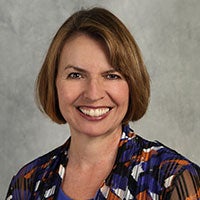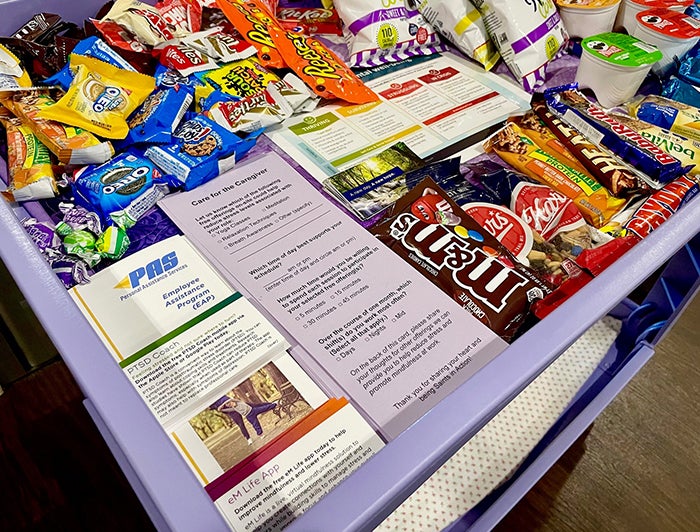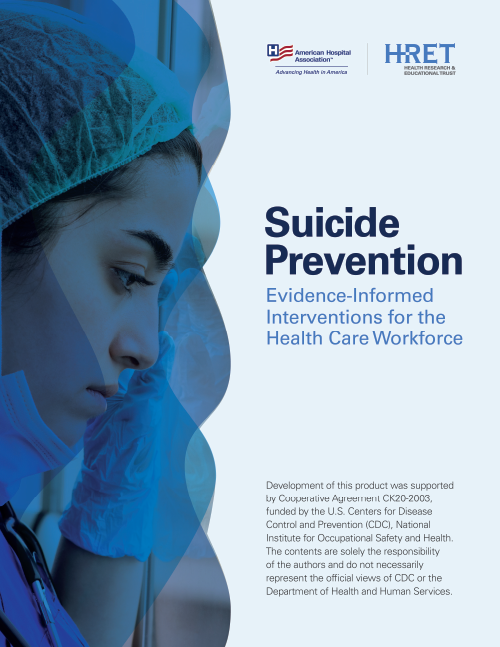The Suicide Prevention Guide in Action
37 AHA member organizations participated in an AHA-led learning collaborative with the goal of creating or expanding their health care worker well-being and suicide prevention programming.
Health care workers selflessly care for others every day. And sometimes they are the ones who need care and support from their leaders and peers to get through the tough days. Hospitals and health systems are committed to supporting the mental well-being of their workforces by reducing the stigma of seeking behavioral health care, improving access to services and reducing job stressors.
AHA is pleased to offer resources that make it easier for hospitals and health systems to discover proven strategies and deploy best practices that improve the mental health and well-being of their staff and breathe new life into America’s most trusted professionals.
For those experiencing a suicidal crisis, call the National Suicide Prevention Lifeline at 988 or text the Crisis Text Line by texting HOME to 741741.
Enhancing Well-Being and Preventing Suicide in the Health Care Workforce
3 Drivers of Suicide in the Health Care Workforce

Stigma
The stigma associated with behavioral health disorders and the fear of losing their medical license often impacts health professionals' willingness to seek help and can increase the risk of suicide.
Video
You’re Not Alone: Addressing Behavioral Health-Related Stigma in Health Care
Ann Schumacher, president, CHI Health Mercy Council Bluffs, talks about breaking the stigma surrounding talking about behavioral health concerns among health care workers.

Access
Health care workers are most likely to seek out behavioral health and well-being services when there are multiple options that are accessible (via both on- and off-site care options), affordable, convenient and anonymous.
Podcast
Preventing Suicides in the Health Care Workforce: Lifesaving Steps from Providence
Arpan Waghray, M.D., chief medical officer of behavioral medicine at Providence and chief executive officer at Providence’s Well Being Trust, as well as chair of the Behavioral Health Committee, American Hospital Association.

Job Stressors
Health care workers can experience situations on the job that are stressful, emotionally draining and uncertain. This can contribute to feelings of psychological distress that, when not addressed, can be detrimental to their mental well-being.
Podcast
Preventing Suicides in the Health Care Workforce: The Role of Resilience
Gina Sharp, president and chief executive officer, and Lindsey Harrington, Psy.D., manager, psychology and counseling, both at Linden Oaks Behavioral Health, part of NorthShore – Edward-Elmhurst Health.
Finding the Right Words
The Role of Peer Support with Mental Health

Luci New, Wake Forest University School of Medicine
In this podcast, Luci New joins Jordan Steiger, senior program manager of clinical affairs and workforce at AHA, to share how her organization is using a peer support model and QPR (Question, Persuade, Refer) Suicide Prevention Training to empower and educate the workforce to respond to colleagues who are experiencing mental health concerns or suicidal ideation.
This work is part of an ongoing AHA initiative to support hospital and health system leaders in their efforts to enhance the mental well-being of the health care workforce and prevent health care worker suicides.
The work of the initiative has been captured in a newly-released guide from AHA titled “Suicide Prevention: Evidence-Informed Interventions for the Health Care Workforce.”
Taking Action - St. Luke's Health
While health care workers are often called heroes — and we understand why — they are human too. In this video, Mindy Estes, M.D., chief executive officer, St. Luke’s Health System, and past chair, AHA Board of Trustees, shares a story about the reality of suicide risks among health care workers and how hospital and health system leaders are creating hope through action. Learn how St. Luke’s is taking critical steps to reduce the stigma surrounding behavioral health, improve access to treatment and reduce job stressors whenever possible. Hear Dr. Estes' call to action for other health care leaders to do the same, as much work remains to be done.
Resources
National Library of Medicine
The National Center for Biotechnology Information advances science and health by providing access to biomedical and genomic information.
It is important to understand the difference between burnout and behavioral health disorders. Burnout is a long-term stress reaction defined by having at least one of the following symptoms: 1) emotional exhaustion; 2) depersonalization, including cynicism and a lack of empathy; and 3) a low sense of personal accomplishment. Burnout can be a contributing factor or trigger for mental illness, but individuals can be burned out without having a psychiatric or substance use disorder. As you review the resources, please keep this distinction in mind.
Stories from the Field
Building Resilience Among Health Care Workers During The Holidays

Children’s Hospital Colorado is proactively addressing holiday stress and its impact on health care workers who already are stretched at work as the trifecta of COVID-19, RSV and the flu are forcing more hospitals into crisis.
Prioritizing The Mental Health Of Health Care Workers

When Larry Phillips, diplomat of clinical social work at SSM Health St. Anthony Hospital, first learned of the “second victim” concept impacting health care workers, he took action and developed a “Care for the Caregiver” initiative at his facility.


